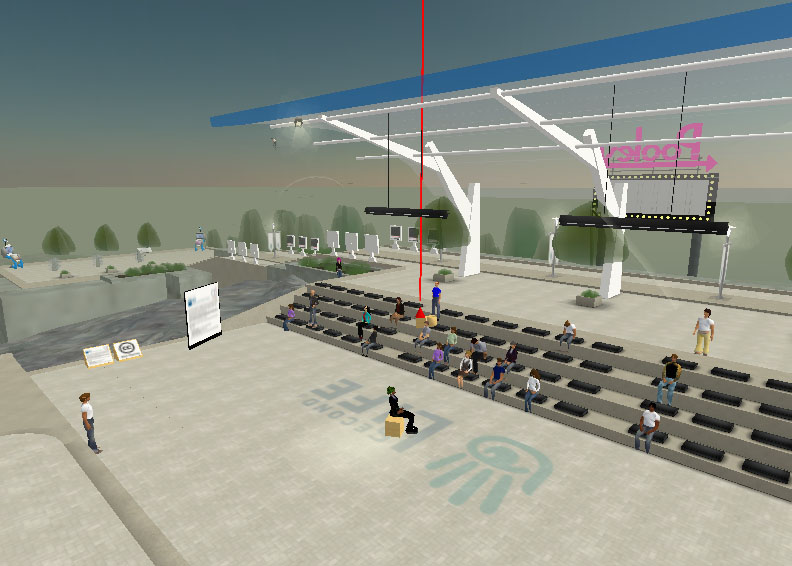 As I've mentioned previously, today I took part in an online event to mark World Intellectual Property Day, held within the Second Life space. Very interesting event, with only a small number of technical issues. I did make a recording of it, but I think there was also an official recording which I imagine will be available in due course... Anyway, here's (roughly) what I said:
As I've mentioned previously, today I took part in an online event to mark World Intellectual Property Day, held within the Second Life space. Very interesting event, with only a small number of technical issues. I did make a recording of it, but I think there was also an official recording which I imagine will be available in due course... Anyway, here's (roughly) what I said:
Towards an Intellectual Property Framework for Produsage
Remarks by Axel Bruns, World Intellectual Property Day - 26 April 2006
I'm going to be taking something of a big-picture angle here. A good deal of my research in the past few years has been particularly in the collaborative publishing of alternative online news, and more widely in blogging overall as well as the increasing use of wikis for collaborative knowledge management and content creation.
I'd like to suggest that such cases of widely distributed collaborative content production which is often led by users themselves are all part of a wider trend which has its roots in part in the academic model of peer review and peer criticism, in artistic collaboration, and more recently especially also in the frameworks developed for open source software development.
There have been a number of ways to describe this, from the idea of the prosumer to Charles Leadbeater's description of pro-am content development; Yochai Benkler calls it 'commons-based peer-production'. All of these describe related concepts, but I'm keen to get away from terms like 'professional', 'production', 'consumption' as I think that they all still hark back to traditional producer/consumer dichotomies which have been thoroughly undermined in recent years.
Personally, I think production and usage are now increasingly two sides of the same coin, and we produce new content in the very process of using what's already there - so I've started to call this phenomenon produsage. Produsage isn't necessarily new, of course - but the industrial age had imposed an artificial distinction between producers and consumers which is now evaporating.
What persists, I think - and I say this as someone who certainly isn't a legal expert - are intellectual property frameworks which are built on that separation of producers and consumers: they regulate the production and consumption of IP, when it's becoming increasingly necessary instead to develop protocols for the produsage of IP instead.
That said, then: produsage, in my view, has four fundamental characteristics, and a new IP framework for produsage needs to take these into account.
First, produsage is inherently collaborative - if usage becomes productive, then this is necessarily a collaboration between previous and current users and producers (or for short, produsers), and amongst multiple produsers contributing at the same time. But, it's not necessarily a collaboration which has been explicitly sanctioned by the holders of existing IP.
Second, produsage is often led by users, or at least involves them very closely. The process here is often one of trial and error, and some compare this to evolutionary processes - this creates another problem as the outcomes of produsage aren't necessarily known beforehand, and so it's difficult to use traditional IP licencing processes to grant the rights to use existing content if the final outcome is unknown.
Third, and perhaps most problematically, produsage is palimpsestic - it builds on what's already there, and alters and overwrites this. The Wikipedia is perhaps the most obvious example of this, of course, but there are many more. This creates even bigger problems for traditional IP frameworks: not only is it difficult to foresee the final outcomes of the process, but on the one hand, there are no final outcomes as the process is an ongoing one, and on the other, whatever temporary outcomes are prodused involve a complex process of collaborative authorship which can literally lead to artefacts where individual participants contributed only a word here or there. In theory, the Wikipedia could certainly track which contributors added what bits of content, but in practice, doing so (and indeed tracking licencing permissions or distributing royalties) would be an absolute nightmare.
Which leads me to the fourth point: many such produsage environments already are employing a variety of alternatives to standard copyright licencing - whether in the form of open source licences, the GPL which is used by the Wikipedia, or creative commons licences.
I'm really not sure that even this can be the end point of the development, though. Such alternative licences are great for alleviating the increasingly restrictive frameworks which the major players in the content industries have been able to get inscribed into copyright law, but they don't challenge the fundamental assumption that intellectual property is about the rights of producers and consumers as two very distinct groups.
Instead, what is needed at a more fundamental level is the development of intellectual property regimes which move away from that dichotomy: we need intellectual property regimes which are built around the idea of produsage (or whatever we end up calling it) rather than production and consumption. This would recognise that the development of IP is now (and in fact perhaps has always been) a widely distributed, sometimes ad hoc, and perennially unfinished process which involves users and producers - or in short, produsers - of intellectual property.
Just how that's to be done is another question, of course - but not being a legal expert, I'll leave that to our friends of the legal persuasion…












